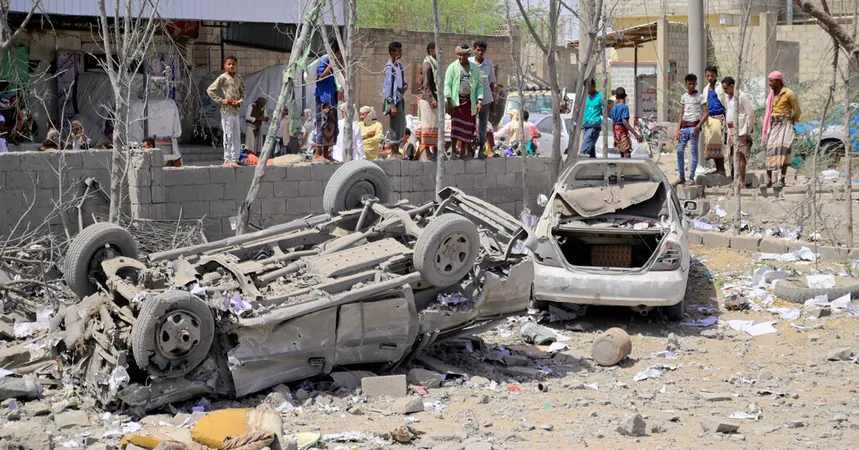
Unfolding Chaos: U.S. Strikes in Yemen Strain Resources Amidst Limited Effectiveness
2025-04-04
Author: Ming
Overview
In a bold declaration this week, President Trump claimed that Iranian-backed Houthi militants in Yemen have been “decimated” by the unwavering airstrikes he ordered on March 15. However, behind closed doors, Pentagon officials have revealed a much harsher reality to Congress and allied countries, indicating that the success of these military operations has been far from substantial.
Current Military Situation
During recent briefings, military officials admitted that their efforts to neutralize the Houthis' extensive underground arsenal of missiles, drones, and launchers have met with only marginal success. Despite Trump's assertions, the bombing campaigns have reportedly been more intense than those conducted during the Biden administration, although officials have publicly downplayed their scale. The Houthis, known for their resilience, have fortified many of their positions, making it more difficult for U.S. forces to disrupt their missile assaults on commercial vessels navigating the Red Sea.
Financial Implications
In a span of just three weeks, an astounding $200 million worth of munitions has been expended, not to mention the operational and personnel costs associated with deploying two aircraft carriers and additional strike aircraft, alongside advanced air defense systems. Estimates suggest that total costs could exceed $1 billion by next week, prompting speculations that the Pentagon may soon require additional funding from Congress.
Concerns Over Military Readiness
Concerns among Pentagon contingency planners are emerging as the rapid depletion of precision munitions, particularly long-range weapons, raises alarms over the U.S. Navy's readiness for any potential conflict, notably regarding a possible Chinese invasion of Taiwan.
Operation Rough Rider
Named Operation Rough Rider, after Theodore Roosevelt's famous regiment during the Spanish-American War, officials anticipate that these U.S. strikes in Yemen will continue for up to six months. Yet some senior Pentagon officials dispute the grim assessments made by congressional and allied sources, asserting that the airstrikes have disrupted Houthi leadership communications and limited their counteractions to ineffective responses.
Claims of Success
The ongoing operations, though criticized, have purportedly diminished the Houthis' command structure, with U.S. officials claiming successes in eliminating several high-ranking members. Intelligence assessments reportedly confirm the operation's effectiveness in both killing key leaders and dismantling facilities believed to be involved in the production of advanced weaponry. Assistant Secretary of Defense Tulsi Gabbard noted these developments, suggesting that Red Sea shipping routes are becoming safer.
Controversy and Criticism
Nevertheless, this military initiative is embroiled in controversy, stemming from a debacle involving senior Trump administration officials who accidentally disclosed sensitive operational details through a group chat on a commercial messaging app. With the Houthis' recent targeting of international shipping lanes and their missile attacks reaching Israel, Trump officials have tried to underscore the urgency of their campaign compared to the relatively restrained approach seen during Biden’s tenure.
Skeptical Outlook
Despite these endeavors, skepticism looms over whether the current military campaign can achieve better results than the previous efforts aimed at curbing Houthi aggression. Senators Jeff Merkley and Rand Paul have urged the administration to clarify its strategy and accountability to Congress, especially after a year of insufficient deterrence against the Houthis.
Targeted Strikes and Limited Disclosure
While the Pentagon confirms strikes have targeted key Houthi infrastructure—including command facilities and arms stockpiles—disclosure on specific results has been minimal. Central Command continues to share images of air operations against the Houthis but is tight-lipped about the overall impact and casualty figures.
Military Strategy and Regional Implications
The long-range munitions currently utilized reflect a significant escalation in the U.S. military's approach, as these weapons are effective against the Houthi air defenses which have previously downed American drones. The offensive didn't just target the Houthis but sought to reassure regional allies, with the Pentagon moving missile defense systems to partner nations concerned over escalating Houthi actions.
Shift in Command Approach
In stark contrast to the previous administration’s cautious engagement, Trump’s strategy allows regional commanders more direct authority in targeting decisions, which supporters argue has increased operational efficiency. However, the Houthis have reported civilian casualties as a result of these strikes, drawing critical scrutiny.
Iran's Involvement and Warnings
In addressing Iran's role in supporting the Houthis, Trump issued a stark warning: “Support for the Houthi terrorists must end IMMEDIATELY! Do NOT threaten the American People… or Worldwide shipping lanes. If you do, BEWARE, because America will hold you fully accountable.”
Conclusion and Future Outlook
As the conflict in Yemen continues to evolve, it remains to be seen whether the U.S. military operations will bring about meaningful change or suffer the same fate as past campaigns. With tensions escalating, all eyes are on Washington’s next moves in this critical geopolitical theater.




 Brasil (PT)
Brasil (PT)
 Canada (EN)
Canada (EN)
 Chile (ES)
Chile (ES)
 Česko (CS)
Česko (CS)
 대한민국 (KO)
대한민국 (KO)
 España (ES)
España (ES)
 France (FR)
France (FR)
 Hong Kong (EN)
Hong Kong (EN)
 Italia (IT)
Italia (IT)
 日本 (JA)
日本 (JA)
 Magyarország (HU)
Magyarország (HU)
 Norge (NO)
Norge (NO)
 Polska (PL)
Polska (PL)
 Schweiz (DE)
Schweiz (DE)
 Singapore (EN)
Singapore (EN)
 Sverige (SV)
Sverige (SV)
 Suomi (FI)
Suomi (FI)
 Türkiye (TR)
Türkiye (TR)
 الإمارات العربية المتحدة (AR)
الإمارات العربية المتحدة (AR)